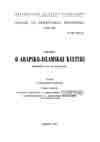Dva koncepta političke filozofije (Ibn Rušd i Ibn Haldūn)
Two concepts in political philosophy (Ibn Rušd and Ibn Haldūn)
Author(s): Hasan SušićSubject(s): Philosophy
Published by: Orijentalni Institut u Sarajevu
Summary/Abstract: This paper starts with the assumption that it is possible to do a comparative study of the political conceptions of Ibn Rušd and Ibn Haldūn, both from the point of view of similarities and differences in their teachings. As far as the intellectual assumptions of Ibn Haldūn's work are concerned it is certain that the most important place belongs to the group of thinkers called the philosophers. lt is through this intellectual movement that a significant relationship between these two thinkers can be established. Bearing in mind that Ibn Haldūn had an outstandingly critical mind, it is exactly this critical attitude which he inherited from Ibn Rušd, although his criticism is of a different nature compared to that of Ibn Rušd. In this sense Ibn Haldūn approaches Ibn Rušd in dealing with the phenomenon of prophetship as well. Thus both thinkers held that the state can be created and established without the sacred investiture, i. e., without the sacred or revealed Law. Unlike lbn Rušd, Ibn Haldūn was not interested in the problem of that society ought to be like but in how it ought to be realized in reality, what its essence is, what are the constitutive elements of society, sociality and the state. Ibn Rušd created the opportunity for Ibn Haldūn to form an esentially historical and realistic theory of society and its history. From the conflict of religion and philosophy Ibn Haldūn was able to draw two important conclusions: 1. that the philosophical concepts which in an ideal way attempted to overcome the conflicts within society cannot really explain the problems and issues so urgently imposed by his age, and 2. that a true study of society and sociality must be critically oriented, whether toward theology or toward history and philosophy. The individual also occupies an important place in the works of both thinkers. However, there is an essential difference between them here, because Ibn Rušd's treatment of the individual and his role is more philosophical, if not more theological, whereas Ibn Haldūn's is more realistic and more sociological. Taken on the whole, political philosophy does not form an integral part of the theories of Ibn Rušd and Ibn Haldūn. As far as the basic themes of political philosophy are concerned, the most obvious difference lies in the treatment of the Law. To the Law, whether it be revealed or not, Ilbn Rušd attributes a much larger significance, whereas Ibn Haldūn emphasizes wazi, rijasi, and asabijja. Ibn Rušd. and Ibn Haldūn start from the fact that an ideal state is in fact the Islamic state of the first khalifs, estalblished on the revealed Law. The difference is in that that Ibn Rušd believed in the possibility of constituting of such a state which, in his opinion, would ibe identical to Plato's ideal State. Ibn Haldūn as a thinker who had an extraordinary sense of history did not believe in the possiibility of regression.
Journal: Prilozi za orijentalnu filologiju
- Issue Year: 1976
- Issue No: 24
- Page Range: 133-139
- Page Count: 7
- Language: Bosnian

